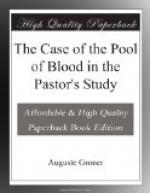And now Muller, making another careful examination of the floor, found something else. It was something that might be utterly unimportant or might be of great value. It was a tiny bit of hardened lacquer which he found on the floor beside one of the legs of the desk. It was rounded out, with sharp edges, and coloured grey with a tiny zigzag of yellow on its surface. Muller lifted it carefully and looked at it keenly. This tiny bit of lacquer had evidently been knocked off from some convex object, but it was impossible to tell at the moment just what sort of an object it might have been. There are so many different things which are customarily covered with lacquer. However, further examination brought him down to a narrower range of subjects. For on the inside of the lacquer he found a shred of reddish wood fibre. It must have been a wooden object, therefore, from which the lacquer came, and the wood had been of reddish tinge.
Muller pondered the matter for a little while longer. Then he placed his discovery carefully in the pastor’s emptied tobacco-box, and dropped the box in his own pocket. He closed the window and the door to the dining-room, lit a lamp, and entered the passageway leading to the vestry. It was a short passageway, scarcely more than a dozen paces long.
The walls were whitewashed, the floor tiled and the entire passage shone in neatness. Muller held the light of his lamp to every inch of it, but there was nothing to show that the criminal had gone through here with the body of his victim.
“The criminal”—Muller still thought of only one. His long experience had taught him that the most intricate crimes were usually committed by one man only. The strength necessary for such a crime as this did not deceive him either. He knew that in extraordinary moments extraordinary strength will come to the one who needs it.
He now passed down the steps leading into the vestry. There was no trace of any kind here either. The door into the vestry was not locked. It was seldom locked, they had told him, for the vestry itself was closed by a huge carved portal with a heavy ornamented iron lock that could be opened only with the greatest noise and trouble. This door was locked and closed as it had been since yesterday morning. Everything in the vestry was in perfect order; the priest’s garments and the censers all in their places. Muller assured himself of this before he left the little room. He then opened the glass door that led down by a few steps into the church.
It was a beautiful old church, and it was a rich church also. It was built in the older Gothic style, and its heavy, broad-arched walls, its massive columns would have made it look cold and bare had not handsome tapestries, the gift of the lady of the manor, covered the walls. Fine old pictures hung here and there above the altars, and handsome stained glass windows broke the light that fell into the high vaulted interior. There were three great altars in the church, all of them richly decorated. The main altar stood isolated in the choir. In the open space behind it was the entrance to the crypt, now veiled in a mysterious twilight. Heavy silver candlesticks, three on a side, stood on the altar. The pale gold of the tabernacle door gleamed between them.




